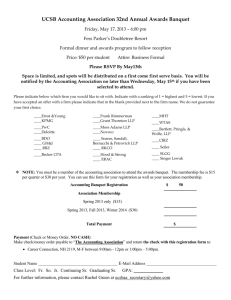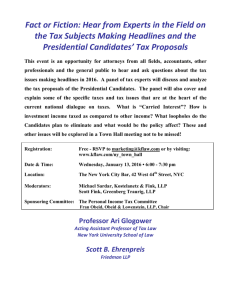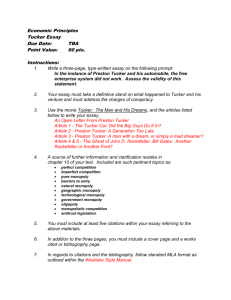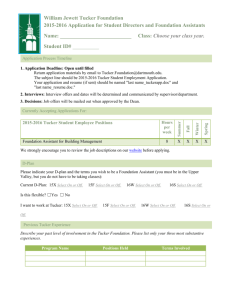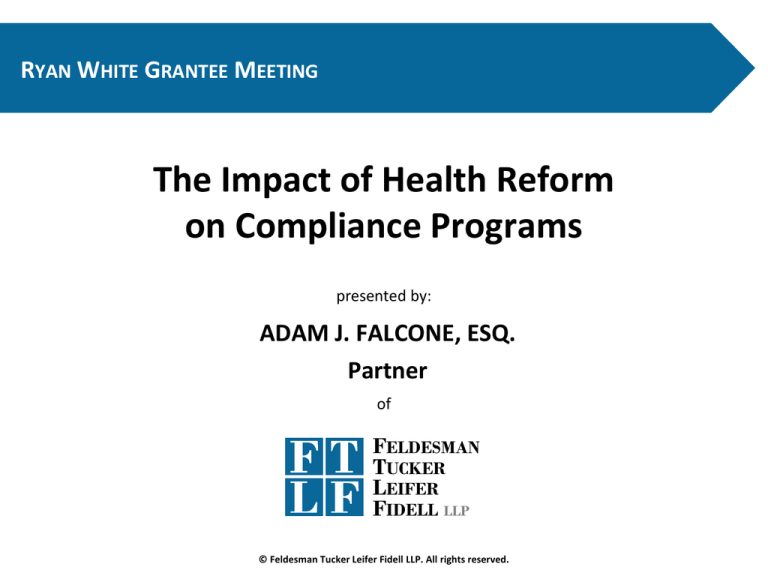
RYAN WHITE GRANTEE MEETING
The Impact of Health Reform
on Compliance Programs
presented by:
ADAM J. FALCONE, ESQ.
Partner
of
FELDESMAN
TUCKER
LEIFER
FIDELL LLP
© Feldesman Tucker Leifer Fidell LLP. All rights reserved.
The Impact of Health Reform on Corporate Compliance
FELDESMAN
TUCKER
LEIFER
FIDELL LLP
© Feldesman Tucker Leifer Fidell LLP. All rights reserved.
2
www.FTLF.com
After Health Reform….
Knowing
Retention of
Overpayments
Higher Risk of
False Claims Act
liability
RAC
Program
Expansions
FELDESMAN
TUCKER
LEIFER
FIDELL LLP
Mandatory
Return of
Overpayments
within 60 days
Lower hurdle
for Qui Tam
(whistleblower)
lawsuits
Patient
Protection and
Affordable Care
and Act
New Funding
of Medicare and
Medicare Program
Integrity
Enforcement
Enhanced
CMP
Penalties
Increased
OIG
Authorities
Mandatory
Compliance
Programs
Condition of
Enrollment
© Feldesman Tucker Leifer Fidell LLP. All rights reserved.
3
www.FTLF.com
Key Compliance Implications of Health Reform
Greater OIG
enforcement
authority
Compliance
program
requirements
Increased
program
integrity
activities
Mandatory
return of
overpayments
Higher risk of
False Claims
Act liability
FELDESMAN
TUCKER
LEIFER
FIDELL LLP
© Feldesman Tucker Leifer Fidell LLP. All rights reserved.
4
www.FTLF.com
Compliance Program Mandate
• Under Health Reform Law:
• As a condition of enrollment in Medicare, Medicaid,
and CHIP, providers must establish a compliance
program
• Expansion of Medicaid under Health Reform Law
• Core components of compliance program to be
established by the Secretary of HHS in consultation
with the OIG
• Will be specific to particular industry or category of
supplier or provider
• Effective after HHS issues regulations
FELDESMAN
TUCKER
LEIFER
FIDELL LLP
© Feldesman Tucker Leifer Fidell LLP. All rights reserved.
5
www.FTLF.com
Mandatory Return of Overpayments
• Health Reform Law requires providers to return and
report “overpayments” from the Medicare or
Medicaid programs within:
• 60 days of identification or
• Date corresponding cost report is due
• Health reform law defines “overpayment” as funds
that a person or entity receives or retains under
Medicare or Medicaid to which the person or entity,
after applicable reconciliation, is not entitled.
FELDESMAN
TUCKER
LEIFER
FIDELL LLP
© Feldesman Tucker Leifer Fidell LLP. All rights reserved.
www.FTLF.com
6
Medicare Overpayments Rule
• CMS issued proposed rule February 16, 2012
• Applies only to payments received or retained under
Medicare Part A and Part B
• Adopts definitions from the Health Reform Law
• Overpayment: Includes as example improper costs in cost
report
• Identified: Knows or should have known standard – imposes
duty to investigate
• Applicable reconciliation: Is the cost report
• Requires use of existing Medicare contractor overpayment
return forms
• Reporting also may be done through OIG or CMS selfdisclosure protocols
• 10 year lookback
FELDESMAN
TUCKER
LEIFER
FIDELL LLP
© Feldesman Tucker Leifer Fidell LLP. All rights reserved.
7
www.FTLF.com
Higher Risk of False Claims Act Liability
• Knowing Retention of Overpayments
• False Claims Act violations result from knowingly and
improperly avoiding or decreasing a payment “obligation”
• Health Reform Law makes the knowing retention of
overpayment beyond due date (i.e., 60 days from
identification or when applicable cost report is due) an
“obligation” under the False Claims Act
• Penalties
• Up to $11,000 per claim and three times the amount of the
overpayment
• OIG can also impose civil monetary penalties (CMPs) or exclude a
provider from participation in Federal health care programs
FELDESMAN
TUCKER
LEIFER
FIDELL LLP
© Feldesman Tucker Leifer Fidell LLP. All rights reserved.
8
www.FTLF.com
Federal Civil False Claims Act
31 U.S.C. § 3729-3733
• The FCA forbids knowingly:
• Presenting or causing the presentation of, a false claim for
reimbursement by a Federal health care program,
including Medicare or Medicaid;
• Making, using or causing to be made or used, a false
record or statement material to a false or fraudulent
claim;
• Repaying less than what is owed to the Government;
• Knowingly and improperly avoiding or decreasing an
obligation to pay the Government; and/or
• Conspiring to defraud the Federal Government through
one of the actions listed above.
FELDESMAN
TUCKER
LEIFER
FIDELL LLP
© Feldesman Tucker Leifer Fidell LLP. All rights reserved.
9
www.FTLF.com
Federal Civil False Claims Act
31 U.S.C. § 3729-3733
• Key Definitions
• Claim = request or demand for money or property if
the government provides money or reimburses a
person or entity
• Knowingly =
• Actual awareness of falsity
• Deliberate ignorance of the truth or falsity
• Reckless disregard of truth of falsity
FELDESMAN
TUCKER
LEIFER
FIDELL LLP
© Feldesman Tucker Leifer Fidell LLP. All rights reserved.
10
www.FTLF.com
Federal Civil False Claims Act
31 U.S.C. § 3729-3733
• Procedure
• Attorney General may bring an action
• Qui tam: Private person (relator) can bring an action
in name of government
• Must submit formal complaint to court
• With written disclosure of all material evidence
• Government has 60 days to review and may request
extension
• Government decides whether to intervene
FELDESMAN
TUCKER
LEIFER
FIDELL LLP
© Feldesman Tucker Leifer Fidell LLP. All rights reserved.
11
www.FTLF.com
Federal Civil False Claims Act
31 U.S.C. § 3729-3733
• Protects employee whistleblowers from “retaliation”
• Whistleblower/Qui Tam Lawsuits
• If government doesn’t intervene, relator may proceed on his or
her own, and pays litigation costs.
• If successful, relator receives 25-30% of proceeds
• If government takes the case, Government pays litigation costs
(and makes litigation decisions)
• If successful, relator receives 15-25% of proceeds
• Public Disclosure Bar
• Relator cannot base case on public record unless relator was
the original source
• Public record = criminal, civil or administrative hearing, congressional
or GAO report, hearing, audit, investigation, or news media
• Original source = direct and independent knowledge of the info and
voluntarily gave to government
FELDESMAN
TUCKER
LEIFER
FIDELL LLP
© Feldesman Tucker Leifer Fidell LLP. All rights reserved.
12
www.FTLF.com
Higher Risk of False Claims Act Liability
• Health Reform Law makes significant changes to qui
tam provisions of the False Claims Act:
• Public disclosure does not require court to dismiss lawsuit
where the government opposes dismissal
• State proceedings and private litigation do not qualify as
“public disclosures”
• Whistleblowers can proceed under the “original source”
exception to public disclosure without direct (i.e., firsthand) and independent knowledge of the allegations so
long as:
• The whistleblower voluntarily provided information to the
government prior to public disclosure and
• The whistleblower’s information must be independent of and
materially add to publicly disclosed information
FELDESMAN
TUCKER
LEIFER
FIDELL LLP
© Feldesman Tucker Leifer Fidell LLP. All rights reserved.
13
www.FTLF.com
Surge in Financial Support for Enforcement Activities
• Federal Health Care Fraud and Abuse Control
Program (HCFAC)
• Established as a requirement under HIPAA to combat
fraud committed against all health plans, both public and
private
• Jointly directed by the Attorney General and HHS OIG
• Designed to coordinate Federal, State and local law
enforcement activities with respect to health care fraud
and abuse
• Health Care Fraud and Abuse Control Account receives
additional $10 million per year for FY 2011-2020
• Reconciliation allocates an additional $250 million to the
Account for FY 2011-2016
FELDESMAN
TUCKER
LEIFER
FIDELL LLP
© Feldesman Tucker Leifer Fidell LLP. All rights reserved.
14
www.FTLF.com
Surge in Financial Support for Enforcement Activities
• Federal Health Care Fraud and Abuse Control Program (HCFAC)
• In FY 2011:
• HCFAC won judgments or negotiated settlements of nearly
$4.1billion
• U.S. Attorneys Offices opened 1,110 new criminal healthcare fraud
investigations involving 2,561 potential defendants
• 743 defendants convicted for healthcare fraud-related crimes
• Federal prosecutors had 1,873 health care fraud criminal
investigations pending, involving 3,118 potential defendants, and
filed criminal charges in 489 cases involving 1,430 defendants
• DOJ opened 977 new civil health care fraud investigations and had
1,069 civil health care fraud matters pending
• Since 1997, HCFAC has recovered $20.7 billion
• Source: HCFAC Annual Report for FY 2011 (February 2012)
FELDESMAN
TUCKER
LEIFER
FIDELL LLP
© Feldesman Tucker Leifer Fidell LLP. All rights reserved.
15
www.FTLF.com
New Enforcement Entities
• In 2006, Congress established a permanent
Recovery Audit Contractor (“RAC”) Program,
designed to review Medicare Part A and B claims
and correct improper payments
• The Health Reform Law expanded the RAC
program to cover Medicare Parts C and D and
Medicaid
• Predicted to save $2.1 billion over the next five years
FELDESMAN
TUCKER
LEIFER
FIDELL LLP
© Feldesman Tucker Leifer Fidell LLP. All rights reserved.
16
www.FTLF.com
New Enforcement Entities
• Final Rule issued by CMS September 16, 2011
• Purpose of RACs: To correct payment errors
• Medicaid RACs must report potential fraud to the State,
which must refer the activity to the appropriate authorities
• Payments must be made to RACs on a contingency
basis
• Compensation scheme is mandated for identified
overpayments
• No compensation scheme is mandated for identified
underpayments
• Compensation to RACs must be based on amounts
recovered
FELDESMAN
TUCKER
LEIFER
FIDELL LLP
© Feldesman Tucker Leifer Fidell LLP. All rights reserved.
17
www.FTLF.com
Recovery Audit Contractors (RACs)
• States have considerable flexibility regarding the design,
procurement and operation of their respective RAC
programs including:
• Establishing the compensation structure for the identification
of underpayments
• The number and frequency of medical records to be examined
• State appeals process
• State exclusion of claims from Medicaid RAC review
• Bundling of procurements
• Coordination of the collection of overpayments
• Contingency fee rates
• States have complete flexibility in the contingency fee rates they pay,
exclusive of Federal financial participation (FFP). Absent an exception,
however, CMS will provide FFP only for amounts that do not exceed the
then-highest contingency fee rate paid to Medicare RACs – 12.5%
FELDESMAN
TUCKER
LEIFER
FIDELL LLP
© Feldesman Tucker Leifer Fidell LLP. All rights reserved.
18
www.FTLF.com
Recovery Audit Contractors (RACs)
• Medicaid Provider Protections
• Medicaid RACs:
• Limited to a three-year look-back period
• Prohibited from auditing claims that they or another entity
(such as Medicare RAC) have already audited
• Must notify providers of overpayment findings within 60
days
• States must provide adequate appeal processes for
providers to dispute adverse determinations made by
Medicaid RACs
FELDESMAN
TUCKER
LEIFER
FIDELL LLP
© Feldesman Tucker Leifer Fidell LLP. All rights reserved.
19
www.FTLF.com
Medicaid Fraud Control Units (MFCU)
• Purpose: Finding and reporting Medicaid fraud
• Also investigate and prosecute patient abuse and
neglect in health care facilities
• MFCUs are state agencies that must be “separate
and distinct” entities from state Medicaid
agencies
• Funded through Medicaid grants to States
• 49 States and the District of Columbia have
established MFCUs
FELDESMAN
TUCKER
LEIFER
FIDELL LLP
© Feldesman Tucker Leifer Fidell LLP. All rights reserved.
20
www.FTLF.com
MFCU Enforcement Record
• Medicaid Fraud Control Units (MFCUs) in FY
2010:
• Obtained 1,329 convictions
• Reached 1,077 civil judgments or settlements
• Referred 942 individuals and entities for exclusion
from Federal health care programs by the OIG
• Recovered:
• $1.8 billion as a result of in court-ordered restitution, fines,
civil settlements, and penalties
FELDESMAN
TUCKER
LEIFER
FIDELL LLP
© Feldesman Tucker Leifer Fidell LLP. All rights reserved.
21
www.FTLF.com
Medicaid Fraud Control Units - Statistics
FELDESMAN
TUCKER
LEIFER
FIDELL LLP
© Feldesman Tucker Leifer Fidell LLP. All rights reserved.
22
www.FTLF.com
The Medicaid Integrity Program
• In February 2006, Congress created the Medicaid
Integrity Program (MIP)
• CMS has two broad responsibilities under the
Medicaid Integrity Program:
• To hire contractors to review Medicaid provider
activities, audit claims, identify overpayments, and
educate providers and others on Medicaid program
integrity issues
• To provide effective support and assistance to States
in their efforts to combat Medicaid provider fraud
and abuse
FELDESMAN
TUCKER
LEIFER
FIDELL LLP
© Feldesman Tucker Leifer Fidell LLP. All rights reserved.
23
www.FTLF.com
The Medicaid Integrity Program
Medicaid Integrity
Program
Division of
Medicaid Integrity
Contracting
Division of Field
Operations
Education MICs
FELDESMAN
TUCKER
LEIFER
FIDELL LLP
Division of Fraud
Research and
Detection
Audit MICs
Review MICs
© Feldesman Tucker Leifer Fidell LLP. All rights reserved.
24
www.FTLF.com
Office of Inspector General (OIG)
• OIG Enforcement Activities
• FY 2011:
• $5.1 billion expected health care recoveries
• 2,262 individuals and entities excluded from participation in
Federal health care programs
• 1,105 prosecutions or settlements
• 614 criminal actions involving health care offenses
• 375 civil actions involving health care offenses
• 6,848 complaints received for investigation
• Source: OIG Budget Request to Congress for FY 2013
(February 2012)
• FY 2000 (the last time data were released):
• OIG’s fraud “hotline” received 526,780 calls
FELDESMAN
TUCKER
LEIFER
FIDELL LLP
© Feldesman Tucker Leifer Fidell LLP. All rights reserved.
25
www.FTLF.com
Federal Grants Financial Management
• All Federal grantees must comply with requirements of 45
C.F.R. Part 74, including financial management
• Risk areas include:
• Failure to create written procedures for determining
reasonableness, allowability, and allocability of costs
• And failure to follow those policies after they are implemented
• Failure to comply with federal procurement requirements
before awarding contracts worth more than $25,000
• Failure to use personal activity reports to ensure staff
time was allocated to the correct grant (where the
organization had multiple funding streams)
FELDESMAN
TUCKER
LEIFER
FIDELL LLP
© Feldesman Tucker Leifer Fidell LLP. All rights reserved.
26
www.FTLF.com
Past OIG Audit Investigation Findings
• Not using actual costs as the basis to charge the
program* - Big One!
• Assessing higher client copayments than
appropriate
• Not separately accounting for copayments
collected
• Not using copayment funds to provide additional
program services
• Providing services to ineligible clients
FELDESMAN
TUCKER
LEIFER
FIDELL LLP
© Feldesman Tucker Leifer Fidell LLP. All rights reserved.
27
www.FTLF.com
Office of Inspector General (OIG)
• Under the Civil Monetary Penalties (CMP) Law, the Office
of Inspector General (OIG) may assess penalties for:
• False and fraudulent conduct related to Federal health care
programs or beneficiaries, which includes submission of claims
that are:
• False or fraudulent
• Provided by someone who has been excluded from participation in
Federal health care programs
• Prohibited by the beneficiary inducement law
• OIG may assess penalties of up to $11,000 for each item or
service falsely claimed and up to three times the amount
falsely claimed
• OIG may also seek to exclude the provider from
participation in Federal and State health care programs
FELDESMAN
TUCKER
LEIFER
FIDELL LLP
© Feldesman Tucker Leifer Fidell LLP. All rights reserved.
28
www.FTLF.com
Expanded Enforcement Authorities
• Health Reform Law authorizes the OIG to impose CMPs
when a provider:
• Fails to report and return an overpayment, as required under the
new Health Reform Law requirement
• Orders or prescribes a medical or other item or service during a
period in which the provider was excluded from a federal
healthcare program, if the provider knows or should have known
that a claim for such medical or other item or service will be
made
• Knowingly makes false statements, omissions, or
misrepresentations of a material fact in any application, bid or
contract to participate or enroll in a Federal health care program
• Fails to grant to the OIG timely access to documents for the
purpose of audits, investigations, evaluations, or other statutory
functions
FELDESMAN
TUCKER
LEIFER
FIDELL LLP
© Feldesman Tucker Leifer Fidell LLP. All rights reserved.
29
www.FTLF.com
Increased Financial Penalties
• Health Reform Law increases Civil Monetary
Penalties:
• Increases the penalty for a false statement or
misrepresentation to $50,000
• Allows up to $15,000 per day that provider refuses
access to OIG
FELDESMAN
TUCKER
LEIFER
FIDELL LLP
© Feldesman Tucker Leifer Fidell LLP. All rights reserved.
30
www.FTLF.com
Office of Inspector General (OIG)
• Debarment and Exclusion
• No Federal health care program payment may be
made for any items or services furnished by an
excluded individual or entity
• Extends to payment for administrative and management
services not directly related to patient care, but that are a
necessary component of providing items and services to
Federal program beneficiaries
FELDESMAN
TUCKER
LEIFER
FIDELL LLP
© Feldesman Tucker Leifer Fidell LLP. All rights reserved.
31
www.FTLF.com
Responsible Corporate Officer Doctrine
• Under the responsible corporate officer (RCO) doctrine,
individual corporate officers can be found guilty of
violating a variety of federal laws without exhibiting any
unlawful intent, negligence, knowledge of the violation
or direct participation in the wrongdoing
• Instead, under the RCO doctrine, the government only
needs to prove that the executive did these three things:
• Held a position of responsibility and authority in the
corporation
• Had the ability to prevent the violation
• Failed to prevent the violation
• Sticking one’s head in the sand has never been so
dangerous!
FELDESMAN
TUCKER
LEIFER
FIDELL LLP
© Feldesman Tucker Leifer Fidell LLP. All rights reserved.
32
www.FTLF.com
OIG Permissive Exclusion Authority
• In October of 2010, HHS-OIG issued guidance on
how it would exercise its discretionary authority
to debar individual corporate officers when their
company violates health care laws
• Factors the OIG will use for permissive exclusion:
• Circumstances of the Misconduct and Seriousness of
the Offense
• Individual’s Role in the Sanctioned Entity
• Individual’s Actions in Response to the Misconduct
• Information about the Entity
FELDESMAN
TUCKER
LEIFER
FIDELL LLP
© Feldesman Tucker Leifer Fidell LLP. All rights reserved.
33
www.FTLF.com
Office of Inspector General (OIG)
• Debarment and Exclusion
• All Federal grant applicants and sub-recipients are
required to make appropriate certifications that
neither they nor their principals are (or have been)
• Presently or proposed for debarment/suspension
• Declared ineligible
• Voluntarily excluded
• Within the last 3 years, convicted of or have a civil
judgment against them (or are presently indicted or
charged) with respect to fraud, a criminal offense, an
antitrust violation, embezzlement, bribery, falsification,
theft, or forgery
FELDESMAN
TUCKER
LEIFER
FIDELL LLP
© Feldesman Tucker Leifer Fidell LLP. All rights reserved.
34
www.FTLF.com
Office of Inspector General (OIG)
• OIG Exclusions List
• http://www.oig.hhs.gov/fraud/exclusions/exclusions_
list.asp
• Government Services Administration (GSA)
Excluded Party List System
• http://www.EPLS.gov
• http://www.SAM.gov
FELDESMAN
TUCKER
LEIFER
FIDELL LLP
© Feldesman Tucker Leifer Fidell LLP. All rights reserved.
35
www.FTLF.com
Questions?
Adam J. Falcone, Esq.
1129 20th St. NW, 4th Floor
Washington, DC 20036
202.466.8960
afalcone@ftlf.com
www.ftlf.com
FELDESMAN
TUCKER
LEIFER
FIDELL LLP
© Feldesman Tucker Leifer Fidell LLP. All rights reserved.
36
www.FTLF.com




